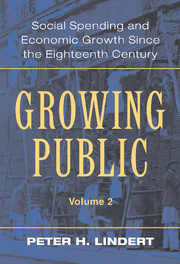Book contents
- Frontmatter
- Contents
- Preface to Volume 2
- PART FIVE THE UNDERLYING FRAMEWORK
- PART SIX ACCOUNTING FOR SOCIAL SPENDING, JOBS, AND GROWTH
- 15 Explaining the Rise of Mass Public Schooling
- 16 Explaining the Rise of Social Transfers, 1880–1930
- 17 What Drove Postwar Social Spending?
- 18 Social Transfers Hardly Affected Growth
- 19 Reconciling Unemployment and Growth in the OECD
- APPENDICES
- Notes
- Bibliography
- Index
15 - Explaining the Rise of Mass Public Schooling
Published online by Cambridge University Press: 12 January 2010
- Frontmatter
- Contents
- Preface to Volume 2
- PART FIVE THE UNDERLYING FRAMEWORK
- PART SIX ACCOUNTING FOR SOCIAL SPENDING, JOBS, AND GROWTH
- 15 Explaining the Rise of Mass Public Schooling
- 16 Explaining the Rise of Social Transfers, 1880–1930
- 17 What Drove Postwar Social Spending?
- 18 Social Transfers Hardly Affected Growth
- 19 Reconciling Unemployment and Growth in the OECD
- APPENDICES
- Notes
- Bibliography
- Index
Summary
Why did some countries lag so far behind others in finally delivering public subsidies that provided schooling for the entire population? Why did some succumb to the argument that primary and secondary education had to wait for decades and centuries until parents finally had the means and the motive to pay for private education?
A striking early example of this lag was spotlighted in Chapter 5. Victorian Britain lagged behind other leading countries in primary and secondary education before closing the gaps after 1891. Yet Britain's lag was brief relative to the lag of a century or more in Third World schooling. Universal schooling is so important to economic growth that the question “Why isn't the whole world developed?” has rightly been tied to the question “Why don't all children complete their primary education?”
Chapter 5 placed much of the blame for delaying mass education on powerful elites opposed to schooling the masses at taxpayer expense. Where political voice was restricted to those holding substantial property, poor children got little help from the taxpayers. This chapter tells more of that global story about elites, voice, and schooling. We begin with statistical evidence about the determinants of public primary and secondary schooling. While several forces play roles, the results confirm the central role of democratic voting rights. A second section then adds statistical evidence to support the assumption that democracy causes schooling more than schooling causes democracy.
- Type
- Chapter
- Information
- Growing PublicSocial Spending and Economic Growth since the Eighteenth Century, pp. 33 - 50Publisher: Cambridge University PressPrint publication year: 2004



